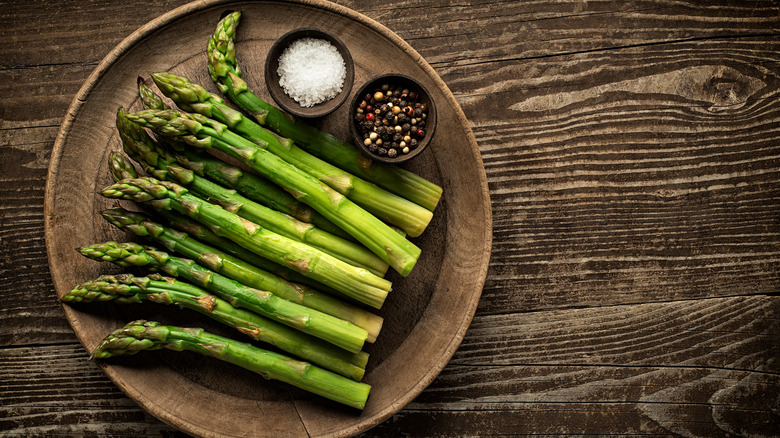This Is What Happens When You Eat Asparagus Every Day
Asparagus is a spring vegetable known for its long, slender spears. But this green veggie has much more than looks to offer — it's also packed with vitamins, minerals, and other nutrients. According to Healthline, half a cup of asparagus contains only 20 calories and 0.2 grams of fat while boasting 2.2 grams of protein and 1.8 grams of fiber. This serving size also contains over half of your daily recommended intake of vitamin K, which is a nutrient that helps your blood clot correctly and keeps your bones healthy.
In addition to vitamin K, asparagus contains vitamins A, C, and E, potassium, phosphorous, iron, zinc, and riboflavin. It is also high in folate, which can help with healthy pregnancies, cell growth, and DNA formation. Like many other vegetables, asparagus has many antioxidants. These compounds protect the body from harmful free radicals. These also help lower blood pressure, strengthen the immune system, and offer anticancer benefits. You'll get the most benefits from these antioxidants if you do not overcook your asparagus before eating it. Boiling asparagus for too long can cause vitamins to be pulled out by the water (via Health).
Asparagus can improve digestion and aid in weight loss
This vegetable has a high fiber content, which offers many health benefits of its own. Fiber helps keep you full after eating and improves digestion. "Asparagus is known to help stabilize digestion due to the high amount of fiber and protein that it contains," nutritionist Laura Flores told Live Science. "Both help move food through the gut and provide relief from discomfort during digestion."
Asparagus's fiber content also makes it beneficial to those trying to lose weight. You can eat a large amount of this vegetable without consuming many calories and all that fiber will keep you satisfied for a long time. This, in turn, will prevent you from overeating later.
Asparagus can be found at most grocery stores and many farmer's markets, depending on the season. When selecting a bunch, you'll want asparagus that has a rich green color and is firm to the touch. Avoid asparagus that is wilted or slimy. Asparagus can be boiled, roasted, or sautéed and pairs well with many other foods. Some people may want to season it with salt and pepper before eating, but it can be enjoyed plain if you like the flavor.


